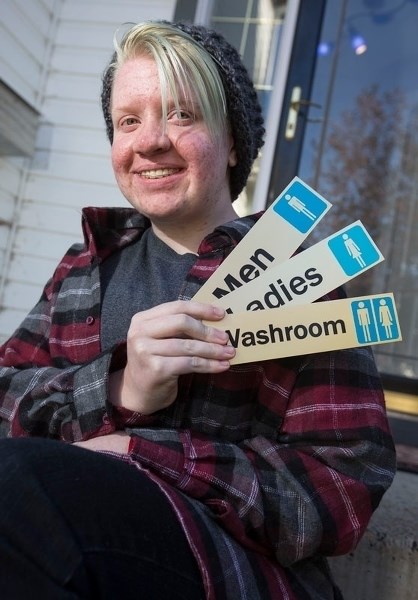More than eight in 10 Canadians say the federal government should ban discrimination based on gender identity – a level of support that comes as a pleasant surprise to many St. Albert transgender advocates.
More than eight in 10 Canadians say the federal government should ban discrimination based on gender identity – a level of support that comes as a pleasant surprise to many St. Albert transgender advocates.
The Angus Reid Institute (a non-profit survey group based in Vancouver) released a study earlier this month on public attitudes towards transgender issues in Canada. The survey polled 1,416 Canadians online about attitudes towards trans Canadians.
The study has popped up while the federal government is debating Bill C-16, which, if passed, will make it illegal to discriminate against someone based on gender identity or gender expression.
The study found that 84 per cent of Canadians wanted the federal government to prohibit discrimination based on gender identity, which is the thrust of Bill C-16.
Study author Ian Holliday said he was surprised by this result, noting that about 57 per cent of respondents strongly supported the move.
“I was expecting a majority of Canadians to support that, but I wasn't expecting such strong support.”
Much of the change with lesbian, gay and bisexual rights came about due to the fact that most people knew someone from that community, Holliday said. Given that 72 per cent of respondents said they didn't know anyone who was trans, he expected much less enthusiasm for trans rights.
“I think Canadians think of themselves as a nation of rights,” Holliday said, when asked about this support, and want to see those rights extended to as many groups as possible.
“It makes them feel good as Canadians.”
The gay rights movement may also have paved the way for trans acceptance, he added.
Paul Kane graduate and trans student Max Quilliam was also surprised by the survey's results.
“When I talk to adults, there are still a lot of people I encounter who don't really know what transgender is.”
Less surprised was Kristopher Wells of the University of Alberta's Institute for Sexual Minority Studies and Services, who noted that a Leger poll held earlier this year found that 67 per cent of Albertans supported initiatives to protect trans students.
“Albertans don't have a problem with this issue,” he said.
“It's very clear we should be moving forward on inclusion and inclusion of transgender children in this province.”
Disagree on details
The survey found broad, high-level support for trans issues, Holliday said. About 85 per cent of respondents agreed that “transgender people face a lot of discrimination in their daily lives,” with 77 per cent agreeing that Canada should work to protect and accommodate them in society.
Support was less clear when the survey addressed specific issues such as bathrooms.
While Canadians were 66 to 68 per cent likely to support a child using the bathroom that corresponds to their gender identity, just 41 per cent said that same principle should apply to adults. About 22 per cent said they should use the washroom that matched their biological sex, while 37 per cent said “it depends.”
“Canadians still have qualms about the bathroom issue,” Holliday said.
“I think this issue is going to stick around for awhile.”
Quilliam questioned the survey's findings that 44 per cent of Canadians thought trans issues were getting too much attention. While Canadians hear a lot about the lives of trans superstars, they don't hear about the everyday issues of trans youth, like being kicked out of your home or murdered because you're trans.
As for the bathroom issue, Quilliam said much of the concern about it was due to people's lack of experience with trans Canadians.
“I know plenty of trans people who just used whatever bathroom they wanted before this all became an issue.”
Wells said he hoped schools, lawmakers and religious leaders would pay close attention to this survey's results.
“Those seem to be areas that are far behind where Canadians are.”
The study is available at angusreid.org/transgender-issues. It is considered accurate to within 2.6 percentage points 19 times out of 20.
